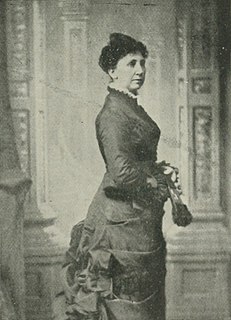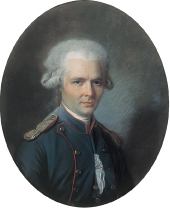A Quote by Susan B. Anthony
Of all the old prejudices that cling to the hem of the woman's garments and persistently impede her progress, none holds faster than this. The idea that she owes service to a man instead of to herself, and that it is her highest duty to aid his development rather than her own, will be the last to die.
Related Quotes
Men and women are made for each other, but their mutual dependence differs in degrees; man is dependent on woman through his desires; woman is dependent on man through her desires and also through her needs; he could do without her better than she can do without him. She cannot fulfill her purpose in life without his aid, without his goodwill, without his respect.....Nature herself has decreed that woman, both for herself and her children, should be at the mercy of man s judgment.
I found her lying on her stomach, her hind legs stretched out straight, and her front feet folded back under her chest. She had laid her head on his grave. I saw the trail where she had dragged herself through the leaves. The way she lay there, I thought she was alive. I called her name. She made no movement. With the last ounce of strength in her body, she had dragged herself to the grave of Old Dan.
My mother didn't feel sorry for herself, she was left with no child support, no alimony at a very young age, with a child to raise, a high school education and she just figured it out. She didn't complain, she didn't rely upon government, she relied upon her own skill set, her own self confidence, her own drive in moxie and her own duty to me and her and she relied upon her family and her faith.
Yet there were times when he did love her with all the kindness she demanded, and how was she to know what were those times? Alone she raged against his cheerfulness and put herself at the mercy of her own love and longed to be free of it because it made her less than he and dependent on him. But how could she be free of chains she had put upon herself? Her soul was all tempest. The dreams she had once had of her life were dead. She was in prison in the house. And yet who was her jailer except herself?
Virtue and vice suppose the freedom to choose between good and evil; but what can be the morals of a woman who is not even in possession of herself, who has nothing of her own, and who all her life has been trained to extricate herself from the arbitrary by ruse, from constraint by using her charms?... As long as she is subject to man's yoke or to prejudice, as long as she receives no professional education, as long as she is deprived of her civil rights, there can be no moral law for her!
How was it that he haunted her imagination so persistently? What could it be? Why did she care for what he thought, in spite of all her pride in spite of herself? She believed that she could have borne the sense of Almighty displeasure, because He knew all, and could read her penitence, and hear her cries for help in time to come. But Mr.Thornton-why did she tremble, and hide her face in the pillow? What strong feeling had overtaking her at last?
Perhaps I will die too, she told herself, and the thought did not seem so terrible to her. If she flung herself from the window, she could put an end to her suffering, and in the years to come the singers would write songs of her grief. Her body would lie on the stones below, broken and innocent, shaming all those who had betrayed her. Sansa went so far as to cross the bedchamber and throw open the shutters ... but then her courage left her, and she ran back to her bed, sobbing.
If woman alone had suffered under these mistaken traditions [of women's subordination], if she could have borne the evil by herself, it would have been less pitiful, but her brother man, in the laws he created and ignorantly worshipped, has suffered with her. He has lost her highest help; he has crippled the intelligence he needed; he has belittled the very source of his own being and dwarfed the image of his Maker.
Mother is in herself a concrete denial of the idea of sexual pleasure since her sexuality has been placed at the service of reproductive function alone. She is the perpetually violated passive principle; her autonomy has been sufficiently eroded by the presence within her of the embryo she brought to term. Her unthinking ability to reproduce, which is her pride, is, since it is beyond choice, not a specific virtue of her own.
I shall possess this woman; I shall steal her from the husband who profanes her: I will even dare ravish her from the God whom she adores. What delight, to be in turns the object and the victor of her remorse! Far be it from me to destroy the prejudices which sway her mind! They will add to my happiness and my triumph. Let her believe in virtue, and sacrifice it to me; let the idea of falling terrify her, without preventing her fall; and may she, shaken by a thousand terrors, forget them, vanquish them only in my arms.
Morally a woman has a right to the free and entire development of every faculty which God has given her to be improved and used to His honor. Socially she has a right to the protection of equal laws; the right to labor with her hands the thing that is good; to select the kind of labor which is in harmony with her condition and her powers; to exist, if need be, by her labor, or to profit others by it if she choose. These are her rights, not more nor less than the rights of the man.






































